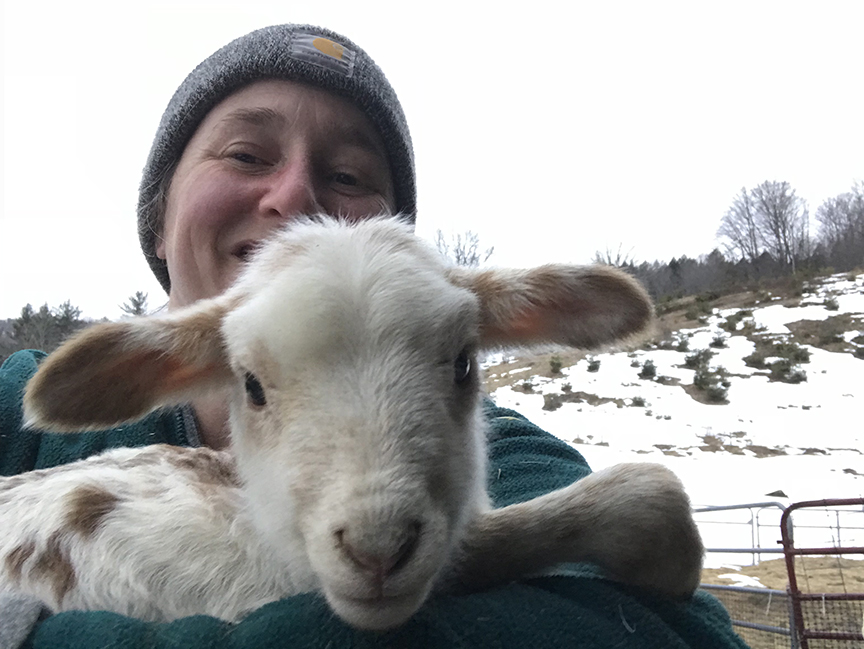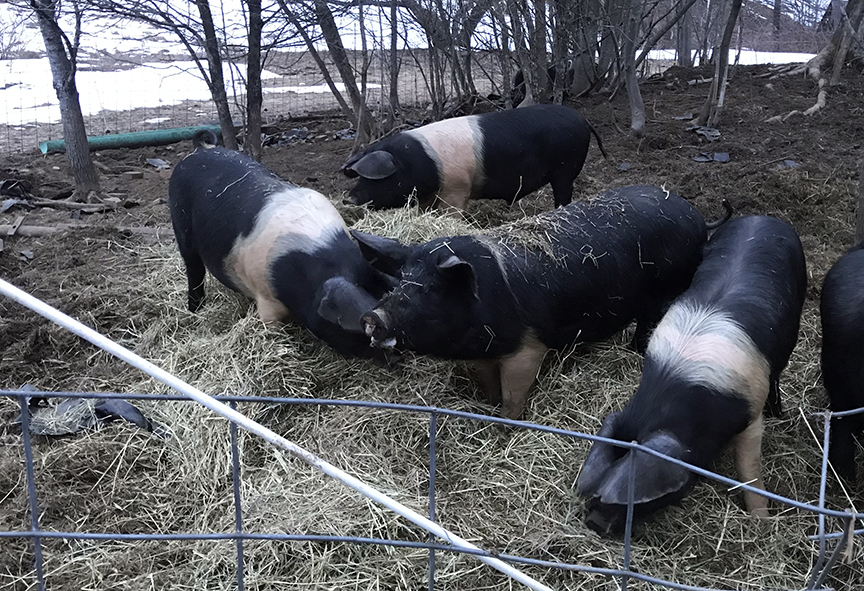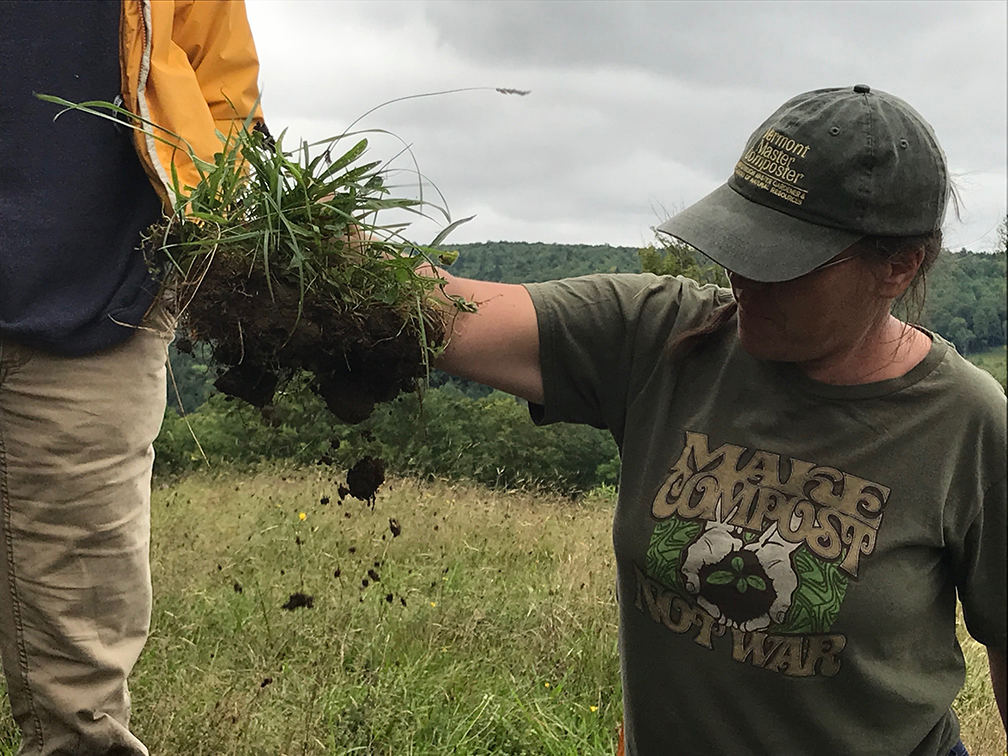Nine Reasons to Stop Feeling Guilty About Eating Meat
Plenty of people love to eat meat, but are concerned that they shouldn’t, because of negative stories that they see about animal products. The environmental impacts of flooding manure lagoons; pictures of animals being treated poorly; the long distances food is trucked to get to our plates; and simply not knowing (or trusting) the companies or agricultural system where the animal came from.
I totally get that.
In college, I joined an animal rights group because I felt strongly that animals should be respected and treated well. I remember sitting in our second or third meeting, feeling a tremendous disconnect from the group’s organizers, who were vegan and proudly wore plastic shoes instead of leather ones. “How is it that plastic is a better choice than a natural product like leather? Shouldn’t we be connected to how our food affects the environment?”, I wondered. I left the group and found a more practical way to improve animal welfare.

Looking back, that was the very beginning of my path toward being a more responsible eater, and eventually, livestock farmer.
Along this path, I’ve been gathering reasons about why we should actually feel good (and not just NOT bad!) about supporting livestock farmers and buying products made from animals.
- We care. I’ve come to understand first-hand that people who do not care about the animals that they partner with, depend upon, and ultimately gather food from (in one form or another) don’t last long as livestock farmers. This isn’t just a job that we can decide not to show up for, or call in sick to. It’s an intense and delicate balance to care enough to be willing to be tired, hot, wet, cold, stiff, muddy, and (name your discomfort) while pushing yourself to put the animals first. And then caring enough to end an animal’s life quickly, when they are sick, or when it’s time to harvest them. Last winter I had to euthanize my two oldest ewes, and I bawled like a baby, but it was the right thing to do because they were suffering.
- We manage the land and the animals well. All of our management is focused on keeping the land and animals healthy. We pay attention to where manure builds up, how much rain is soaked up by the land and stays there (instead of running off to cause floods and damage), and give the animals fresh food every day. Our goal is to be part of a sustainable system that brings more wildlife onto the land, and grows more kinds of food on the same land. A great example includes the apple trees we have been pruning, which now bear more fruit, and attract the tasty, nutritional venison-producing deer! I spend time every day watching and documenting how the land is changing under our management, because I am out on it.
- We let animals have a life and express their natural behaviors. Pigs root, and sheep graze, and turkeys wander and fly. You may not realize, but pigs are great nappers. Much like us, they only get out of bed for a good reason (like breakfast), and they’re quite fond of a Sunday afternoon snooze (every day). They love to explore the world through their noses, and are quite easily bored. A small fenced area with a concrete floor doesn’t really allow a pig to be a pig in its fullest way. Poking around the roots of trees, finding nuts and berries, laying down in a warm patch of sun in the winter, or mud in the summer—these are signs of a pig at its happiest. They make little grunting sounds. That’s what happiness sounds like, and we want them to feel that right to the last moment.

These pigs grew fat and happy nosing around in the tree roots and hay all winter, just expressing their piggiest behavior. - We know (so you know) where the animal came from, how it was raised, and how it died. Some years ago, we bought the Spring piglets from a farm that didn’t raise their own; they shipped them in from Canada. I’m sure the folks in Canada did a fine job, but I really wanted to KNOW where the pigs had come from. I wanted to have a relationship with a person I knew, and be able to count on our relationship well into the future. I think it might also be worth mentioning that those pigs always seemed perpetually stressed, and nippy, throughout their lives. Was it breeding? Was it early life experience? Was it just that batch of piglets?
I’ll never know, because since then (for over 15 years), I’ve bought piglets from the same extended family, who live a couple of towns over. It’s not just that these folks are old friends and adopted family at this point, or that we (through our customers’ support) are helping to maintain two other small farms in addition to ourselves, or that these pigs are blue-ribbon winners at the local fair and are used to help kids get involved in 4H and caring for livestock themselves…NO, it’s about taking some of the mystery out of where our food comes from and adding in some trust. We trust that our friends raise great piglets (and they do).
- Meat such as lamb is nutrient dense. There are good reasons humans have been eating meat for thousands of years, well before the beginning of formal agriculture. Registered dietician Diana Rodgers spends a good deal of time talking about the nutritional benefits of eating meat, and how not all types of meat are equal, either. According to Diana, “grass-fed lamb has a better than 1:2 ratio of omega 3’s to 6’s, where roasted chicken has a ratio of 1:8. It’s also has twice the iron, 3x zinc, and a 3oz portion of lamb contains 2.2 mcg of B12 compared to chicken which has only 0.3. Lamb is simply superior to chicken, nutritionally speaking. Also, for those looking to cause “least harm,” one lamb can produce a lot more meat than a chicken, and an animal raised outdoors on pasture has a much better life than one raised on 100% grain indoors under artificial lighting for its entire life.”
- Some meat production is GOOD for the environment (and not just NOT bad). I know I’ve spent time and blog space above waxing poetic about the pigness of pigs, but the true animal heroines of land management are ruminants. In our case, the sheep. Ruminant animals like cows, sheep, goats, deer, and buffalo, are something magical. They can eat things we can’t eat (like grass), and gain nutrition from them. They have a multi-chambered stomach that acts like a giant beer vat, fermenting fiber to release proteins and sugars that are usable by the animals.
This is a process we humans are simply not designed to do, and it’s a big reason why nomadic people like the Maasaai of Kenya, and folks living in the Swiss Alps are able to survive in very harsh environments; ruminant animals can create food in places that we can not.
I will talk about what “good” grazing management means in another blog post, but the really important thing to understand about grazing animals and the environment is that the ecosystems of Earth co-evolved with animals. Grazing animals helped sequester carbon in the soil through plant roots, kept land open for nesting birds, built deep roots to hold soil in the Great Plains, and encouraged a wide variety of species from spiders and insects to wolves and bears. What we do now using portable fence is recreate what Nature did for millennia before we got involved.

Compost and soil health educator Cat Buxton led a workshop at our farm this summer; teaching us how to monitor and observe changes on the land. - We honor meat all the way to the plate. This is a big one for us, as foodies and cooks. We want to take good care of an animal and give it a full life, but we also want it to taste good. If we invest our time for months or years to raise an animal, and you invest your money to support us and the animal we raised on our farm, we think you should have the best eating experience possible. We want to help you understand how to cook meat properly and enjoy it to its fullest. With every “Stewie” steak and “Tennant” stew, we are grateful for the lives that they share with us, but also it’s an extra way for us to honor them by helping them taste as great as possible. We think the greatest way to honor a life is to lick the plate!
- Being a responsible eater means being connected to the life and death that we are part of. Our goals as farmers and good stewards are to minimize and prioritize how much death is involved in our choice to eat. It’s been said, “everything eats and is eaten.” It’s true that something has to die for us to eat, whether you eat meat, vegetables, grains, or other foods. What might be interesting to know is that what’s the most obvious (above-ground animals) must balance with the less obvious (below-ground animals) in any food system.We simply can not assume that nothing dies when we eat.
It is true that a sheep dies and we eat it. But that sheep lived on grass that housed Orb Weaver spiders, ground wasps, grubs, and dung beetles. Under the soil, there might have been up to 14 tons (per acre) of bacteria, worms, insects, and fungi. In our pasture system, the soil has not been tilled for many years.
Tillage breaks up the soil “housing” microbes, worms and insects. Exposure to air releases carbon into the atmosphere, starving the microbes living there. Tillage is involved in the production of most common vegetable crops, and it is arguably responsible for more death per acre (by number or body weight) than any livestock farm. The path of greater life surviving, and a healthier farm ecosystem, means that the above-ground animal in the system must be harvested. And these concepts about life and death through soil management really put a different spin on whether our food choices are “sustainable” or not.
- It tastes really, really good. Chris and I spend a lot of time eating meat, and it’s the star of the show, as it should be. When you feel a deep connection to a food, and you prepare it well, and the flavor knocks the park out of anything you can find in the supermarket; well, it sure feels like all the pieces have fallen together, just right.
If you’ve felt in your heart like buying local and pastured meats are the right way to go, I hope that by sharing some of my own reasons to eat meat, you’ll be better equipped to handle questions and comments by other people. And that you’ll in general have a better understanding of what sort of life you are contributing to and investing in: the farm, the animals, the soil, ours, and YOUR OWN.
Thanks for reading,
Jenn
I am loving your articles! I have gradually moved from paleo to keto to carnivore…..and I am ‘hungry’ for information to help me confirm that I’m making the best choices for all concerned! LOL! I so appreciate your thoughts. You’ve thought through and researched things that I haven’t and are helping me make this journey easier. I can’t wait to be your neighbor!
I agree! You covered the bases here, my husband and I talk about this sll the time! Thanks for putting it into words!